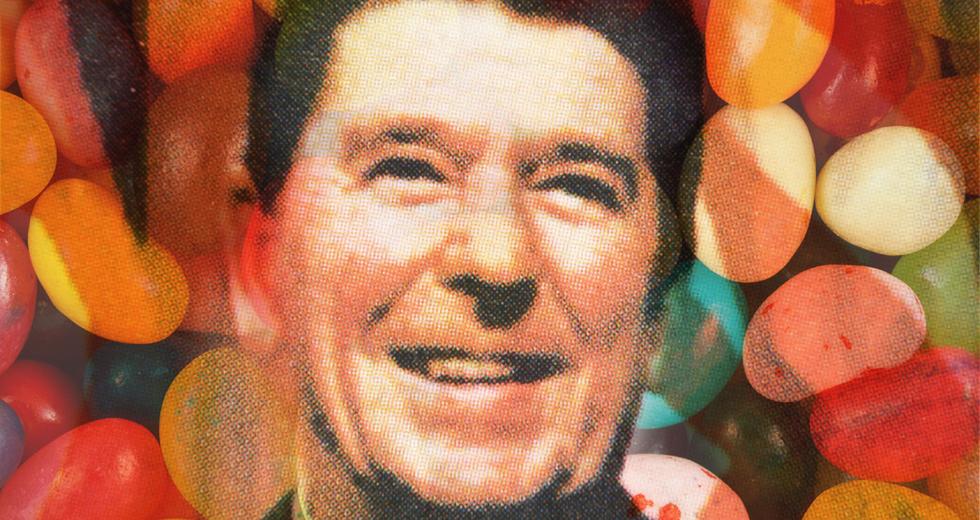It’s a story as old as marketing itself: A company looking to sell more widgets pays a famous person gobs of money to pitch their product and drive up sales. Some celebrities pimp so many products — we’re looking at you, Peyton Manning — we almost forget what made them famous in the first place.
And then there is the curious case of former President Ronald Reagan and his decades-long — yet unofficial — affiliation with Fairfield-based Jelly Belly, the world’s preeminent maker of gourmet jelly beans. It is doubtful anyone has ever been so associated with a consumer product they weren’t being paid to endorse. And yet, not only did Jelly Belly not have to pay the Gipper for all the cache he gave them, the company at first actively tried to downplay the connection.
As Jelly Belly CEO Lisa Rowland-Brasher notes, Regan first took to the beans in 1966 when he was running for the California governor’s office. Rowland’s father and then-CEO Herman Rowland sent candidate Reagan a package of what was then the Herman Goelitz Candy Co.’s new gourmet jelly beans. The soon-to-be governor was trying to stop smoking then and discovered the beans kept him from reaching for his pipe. Rowland continued to send Reagan beans throughout his two terms in office. It quickly became standard procedure for Reagan to start meetings by passing around a jar of the beans, a bit that came to be known as “jelly bean diplomacy.”
But while most entrepreneurs would have given their eyeteeth to have people know such a thing, Rowland-Brasher says her dad wanted the exact opposite.
“My dad just felt that it needed to be kept private,” Rowland-Brasher says. “We didn’t want to benefit from him eating our beans. We just felt that it was the right thing to do to supply him and keep quiet about it.”
But nothing can stay under wraps forever, at least not where it relates to someone on the track Reagan was on then. He ran for president in 1976, and his treasured jelly beans were right there with him. Lou Cannon, then a reporter covering the campaign for the Washington Post and later a noted Reagan biographer, recalls an event at which Reagan was supposed to be interviewed by a local TV news anchor. The crew had arranged a nice, folksy-looking set for the interview. But Reagan’s people had other ideas.
“The advance man entered the set, tossed some fake flowers that were on the coffee table and replaced them with a canister of jelly beans,” Cannon says.
And so it went. Reagan didn’t succeed in that campaign, but he did with the next one. After his election in 1980, word got out that Herman Rowland’s 25-employee, Oakland-based candy company was behind the 2.5 tons of red, white and blue jelly beans used at the inauguration the next January. Rowland became a sudden, if reluctant, celebrity, and Rowland-Brasher says business quickly doubled, going from about $8 million annually to more than $16 million. Orders went from taking weeks to fill to taking months. Scores of employees were hired, production ramped up and the rest is history.
The company, which officially changed its name to the Jelly Belly Candy Co. in 2001, now has over 700 employees and a major manufacturing plant in Thailand, as well as others in Illinois and Wisconsin. It opened its corporate headquarters in Fairfield in 1986.
And while the company may have once wanted to downplay the Reagan connection, these days it is front and center. Visitors, whether to the main offices or those taking a factory tour, will encounter a plethora of Reagan paraphernalia of all kinds, from photos to images of him made out of jelly beans. Rowland-Brasher says she got to meet him once when he was governor and she and her brothers were kids, but her fondest memory is more centered on how much her father enjoyed his time getting to know the man.
“My dad had a nice relationship with him,” Rowland-Brasher says. “He went to the White House every quarter to call on [Reagan]. He was just an amazing man. We miss him.”



